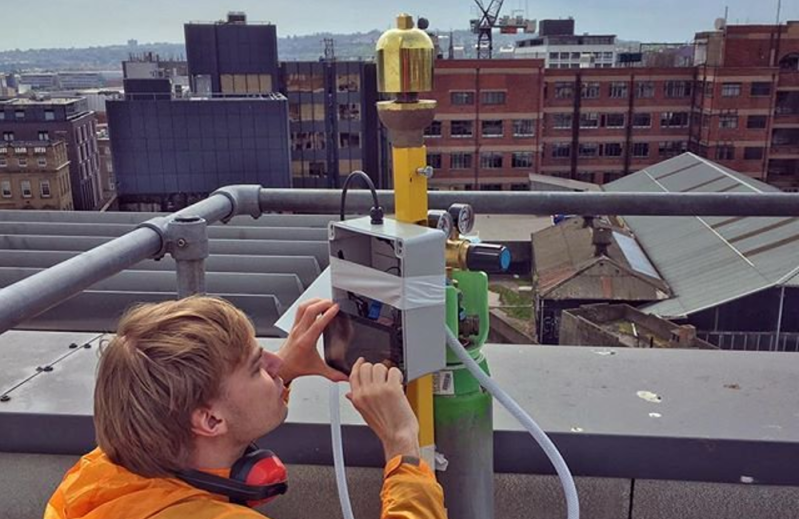In Northern England, the hills used to be home to steam trains. The trains have long faded into history, but the sound of their whistle is making a brief return. Artist [Steve Messam] has created “Whistle” as part of The Great Exhibition of the North. [Steve] doesn’t cover the installation on his website yet, but there have been a few great articles about it in the local press.
Whistle consists of 16 steam engine whistles around Newcastle. From June 22 to September 9, you can hear the whistles at 1pm. First one whistle sounds, then another, then another after that. In all, 16 whistles are included in the art installation, all controlled by Raspberry Pi computers. The Pi’s were programmed by Nebula Labs. Tech details are slim on this one, but we’re guessing each Pi has a Cellular radio built-in.
The whistles used in this installation aren’t old train whistles. They are brand new cast brass whistles based upon the original steam train sounders. The compressed air available today doesn’t sound exactly like steam though, so the brass whistles were modified to sound more authentic. [Steve’s] idea is to get the whistle as perfect as possible, which will trigger the memories of those who are old enough to have heard the originals.
Want to know more about steam engines? Check out this Retrotechtacular about repairing steam locomotives!
















I like the headline
https://www.youtube.com/watch?v=CkcELS9bCh0
:o)
Lot more about the original 2014 project of 18 mile railway installation can be found here: https://mistandmountains.wordpress.com/
Now there needs to be an article on why air through a steam whistle doesn’t sound like steam. I’ve heard steam whistles, and I’ve heard them with air blowing through them. There’s a lot of difference in the sound.
Some years ago, one of the Union Pacific trains that regularly ran through town had a steam whistle hooked up in place of the air horns. Sounded so much better, but of course not like if it had steam. I assume either the engineer retired and took the whistle or the railroad regulators made him put the horns back.
Suggestions are made in the author’s project description (see link above)
“Obviously steam engines use steam instead of compressed air and this in turn makes a difference in the sound. Warm air and steam raise the pitch significantly. The first test on CO2 was a very low note as the gas was expanding liquid gas, and so very cold.
…
Steam engine whistles have a characteristic rise in pitch as they sound – this is caused partly by the increase in pressure as the regulator is opened, and partly the steam warming up the air in the whistle. “
Steam is roughly half as dense as air, so it will sound different. Just like breathing helium and talking.
My first thought was whether they were steam powered to get the correct sound. Good to see that even though they’re not the sound has been adjusted to compensate.
So if you are going for authentic sound, why not use actual steam? Back in the 70’s my dad built a small propane powered boiler specifically for the purpose of blowing a steam whistle. Wasn’t very complicated.
The Elf and Save Tea Department would veto it. Can’t have pressurised inflammable gas cylinders, pressurised boiling water and, heavens above, STEAM !?!. The safety permits would take months and the contingency training would be impossible.
“Elf and Save Tea Department ”
Please elaborate for this Yankee!
Never mind… I got it!
Health and Safety Department!
Great, now I have the image of a Germanic mythical creature hoarding Camellia sinensis.
And it’s only Tuesday.
I immediately found myself wondering whether there will be some attempt to simulate the doppler change of pitch that is heard when the steam railway engine is moving.
Steam and air whistles have their own subset of hackerdom. There are people who maintain and run the air-driven 43-note Tangley Calliaphone, the steam calliopes on the few remaining river steamboats, and the equipment for playing them from punched paper music rolls or from MIDI or similar computer interfaces. The Mechanical Music Digest https://www.mmdigest.com has a section on the calliope: https://www.mmdigest.com/Calliope
because leaving unattended radio controlled bombs all around the city makes the health and safety people twitchy?
Seems to me the installation is intended to run for an extended period without direct supervision. While it would be possible to make autonomous steam boilers the amount of safety precautions that have to be taken make it an engineering project unto itself and probably complicate matters too much over simply adjusting the pitch of the whistles.
Weird, that was supposed to be a reply to DoctorWizard…
https://www.youtube.com/watch?v=jLfD1AFsb1I
Ja, men vem kan förstå norska?
Awesome concept, and clever implementation. But I can’t help but hope there’s a large-scale campaign to make certain that everyone within hearing range knows what’s going on…
e.g. “triggering memories,” in such a way, of folk already in, or questioning their own, senility sounds a bit dangerous if they’re still with-it enough to know that train stopped running long ago.
E.G.2, from experience, a lifetime’s experience knows day-birds don’t sing at midnight; so don’t friggin’ plant a fake bird-call next to a senior-citizen’s-home! May sound funny, but those friggin’ things, allegedly for keeping bird-shit off parked cars, were waging psychological warfare on hundreds of people.